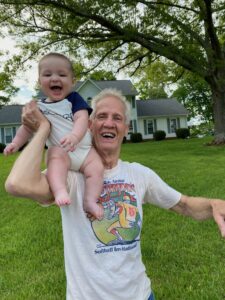Spring 2024

Milestones and Momentum: JHR’s Decade of Humanistic Progress and the Crossroads Ahead
In this special editorial written by Dr. Ruth Purtilo, she reflects on the 10 years since JHR has been active in publishing important health humanities scholarship and envisions what the decade may bring.

At Capacity: How Physical Therapists Will Gain More by Doing Less
At Capacity: How Physical Therapists Will Gain More by Doing Less by Hannah Sy, PT, DPT, JHR’s award-winning 2024 student essay, examines how the increased use of AI in the physical therapy clinic may actually improve humanistic patient care. According to Sy, “the advantage of AI…is its ability to solve complex problems with its capacity to process copious amounts of data.” As physical therapists are assisted in data-based problem-solving and treatment planning by AI, she notes, their time may better be applied to connecting with the human beings they seek to rehabilitate.

“To Doris, On Her Retirement” by Elisabeth Preston-Hsu, MD, MPH
Download the article (pdf) Table of Contents This poem is dedicated to Doris Armour, MD. Leaving this season lush with life, you’ll connect

From Individuals With Aphasia and Brain Injuries to Poets: How the Book I Don’t Think I Did This Right Came to Be
From Individuals With Aphasia and Brain Injuries to Poets: How the Book I Don’t Think I Did This Right Came to Be by Kathryn Paulson, Brendan Constantine, and Jerry K. Hoepner, relates how a group of dynamic poets developed out of a few workshops for individuals with stroke-based aphasia and traumatic brain injuries. Starting out as an idea to spur creativity and help participants share their stories, the meetings quickly developed into the Thursday Night Poets group. Their first published work, described here, offers poetry of deep meaning and resonance for anyone who has ever faced a challenge.

Sonnet of Hope
In this lovely poem, the author pays tribute to the love that restores the soul when an ordeal afflicts the body. He reflects on the healing presence of caring friends and family throughout the process of mending both the injured body and the deflated spirit.

Racetrack
This beautiful and deeply moving poem focuses on a tiny object in a clinical setting. One day, this toy represents incredible joy and possibility, but the next day it evokes sudden loss and tragedy. The poem ends on a somber note, reflecting on the continuous strength of those who care for patients in hospitals.

Can Swearing Be Professional and Patient-Centered?
Exploring the Role of Swearing in the Physical Therapy Clinical Setting by Nicholas B. Washmuth and Adam Meakins, et al, shines a light on a somewhat taboo subject. Is swearing ever appropriate in the physical therapy clinic? Might it actually help give a patient added strength and endurance during a difficult regimen? And what if the physical therapist curses to indicate empathy toward a patient’s challenges? The authors present evidence that some swearing may indeed produce ‘hypoalgesic’ effects in patients, such as increased pain tolerance and compliance.

Through the Lens of Positive Aging
Through the Lens of Positive Aging by David Taylor and Leslie Taylor, et al, offers a fresh approach to the delivery of healthcare for an aging population in the United States – and globally. The ‘humanities interprofessional education activity’ described here is based on the
‘4Ms’ deemed critical for care of the elderly: What Matters; Medication, Mind, and Mobility.

Considerations for Addressing Cisgenderism and Heterosexism in Canadian Outpatient Physiotherapy Clinics
This thought-provoking article by Elizabeth Houdling-Braunberger and Colleen Greasley, et al, presents the results of interviews with individual patients and practitioners regarding Queer and
Trans health issues in physiotherapy clinics throughout Canada. The authors offer guidelines for change at three levels: the micro (individual clinics); meso (physiotherapist training and practice); and macro (community activism), to address specific inequities and improve overall
healthcare for patients adversely affected by cisgenderism and heterosexism.
Discover Your Potential
Download the article (pdf) Table of Contents Hispanic, overweight,lonely, and insecurefrom eight to sixteen,I’m not sure? The doctor said no morerice or tortillas …WHAT —

Poem Against Any More than a Glimpse of the Battered Athlete, or Time for Dr. Pepper, Duracell, Anthem Blue Cross Blue Shield, and the New Chevy Malibu
Download the article (pdf) Table of Contents Coach scowls, calculates. Cue the substitute. Cut straight to commercial break. About the Author(s) Woods Nash, MPH, PhD

